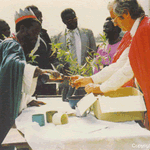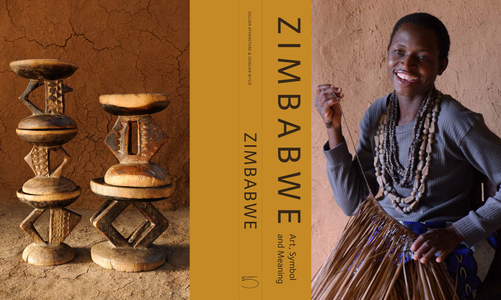African Initiatives

Boston University hosts the second oldest African Studies Center in the United States, and is recognized by the federal government for its excellence in the study of African languages and cultures. The School of Theology is a vital component of African Studies at Boston University, beginning with the sending of graduates to Africa as missionaries over a century ago. Important African alumni include Bishop Josiah Kibira (1964 graduate), the first African head of the Lutheran World Federation; Dr. Kenaleone Ketshabile, Head of the Mission Desk, Methodist Church of Southern Africa; Yusufu Turaki, Professor and former General Secretary of the Evangelical Church of West Africa; and Professor Emmanuel Anyambod, Rector of the Protestant University of Central Africa.

Africa research in the CGCM grows from the work of retired Professor M.L. “Inus” Daneel. His over forty-year presence among African Initiated Churches in Zimbabwe culminated in the 1990s with the largest tree-planting movement in southern Africa, and a program in Theological Education by Extension. The son of missionary parents, Daneel served as a missionary of the Dutch Mission Councils, and then as professor of African theology and missiology at the University of South Africa. He and Professor Robert co-edit the African Initiatives in Christian Mission Series, published by the University of South Africa Press. The goal of the series is to reflect upon contemporary African Christianity, and to document its expansion. Other Africa projects include the digitization of Daneel’s photography and publications on the multimedia site Old & New In Shona Religion, and ongoing research into southern African traditions of earth-care.
See also the Dictionary of African Christian Biography (DACB) listed under Digital Projects.
Dr. Marthinus Daneel, Africa Research Director
New Book Showcasing Zimbabwean Religious Life and Art

Gillian Atherstone and Duncan Wylie have compiled many striking photos of Zimbabwean religious life in a new book entitled Zimbabwe: Art, Symbol and Meaning. The book seeks to preserve religious practices, philosophy, and a way of living which is rapidly passing away. The photography work of CGCM co-founder Dr. Inus Daneel, showcased in one of the CGCM digital projects entitled Old and New in Shona Religion, is an important component of Atherstone's work.
Support Atherstone's project by pre-ordering a copy of the book, or contributing to the project's crowdfunding page.
Learn more about the images curated in this new publication, and watch this video in which Atherstone describes her work with the N'angas, or spirit mediums, in Zimbabwe.
CGCM Graduates Receive African Studies Certificate
Congratulations to Anicka Fast ('20) and Dima Hurlbut ('20), who are among those students who earned the Graduate Certificate in African Studies!

American Academy of Arts & Sciences Elects Two More CGCM Faculty
The American Academy of Arts and Sciences has elected seven historians to become members in 2020. Two of them, Linda Heywood and John Thornton, are faculty associates at the Center for Global Christianity and Mission. They join Dana Robert, as the second and third professors in the CGCM given this high honor.
New Book: Handbook of African Social Ethics
 This handbook, edited by Nimi Wariboko and Toyin Falola, provides a robust collection of vibrant discourses on African social ethics and ethical practices. It focuses on how the ethical thoughts of Africans are forged within the context of everyday life, and how in turn ethical and philosophical thoughts inform day-to-day living. The essays frame ethics as a historical phenomenon best examined as a historical movement, the dynamic ethos of a people, rather than as a theoretical construct. It thereby offers a bold, incisive, and fresh interpretation of Africa’s ethical life and thought.
This handbook, edited by Nimi Wariboko and Toyin Falola, provides a robust collection of vibrant discourses on African social ethics and ethical practices. It focuses on how the ethical thoughts of Africans are forged within the context of everyday life, and how in turn ethical and philosophical thoughts inform day-to-day living. The essays frame ethics as a historical phenomenon best examined as a historical movement, the dynamic ethos of a people, rather than as a theoretical construct. It thereby offers a bold, incisive, and fresh interpretation of Africa’s ethical life and thought.
Call for Papers: COVID-19, Disease, and the World Church
In the midst of a pandemic that is shaking the globe we call for papers for a special issue of Studies in World Christianity that analyse immediate responses to COVID-19 and that give some historical perspective on pandemics or epidemics. We do this in order to resource further response to pandemic whose effects will be with us for some years to come.
The papers may interrogate worldwide Christian responses to the outbreak of COVID-19 around the world by examining how churches have responded theologically and practically as the disease continues to spread. How have Christians responded by offering hope, calling for lament, or proclaiming God’s judgment? What ethical questions about planetary health, palliative care etc. have emerged or been hightened? How has digital media been employed for online church practice or as a vehicle for evangelism and social engagement? How has social distancing shaped understandings of the church community, and in what ways has online church left behind certain sectors of society?
The papers may also provide insight into how the world church in the past understood wide spread disease. Plague and pestilence have regularly been given theological scrutiny in Christian history and have prompted discussions of evil. The 1918-19 Influenza Pandemic influenced Pentecostal growth across the globe, and was instrumental in creating Independent Churches in West Africa who turned to fervent prayer and criticised mission churches for a lack of confidence in God. Missionary photography of plague and leprosy have been used to invigorate support of Western churches and missionary societies. In more recent history, HIV/AIDS has been described by some as the result of sexual sin, whereas the Avian flu and SARS were seen by others as fulfilling end-times prophecy and Ebola has shaken customary palliative care and funeral rites.
It is not uncommon to find articles that address aspects of health and Christian healing. In this special issue we wish to examine worldwide Christian reactions to disease and its spread as a way of understanding and reflecting upon a common problem with different contextual outcomes that have distinct and shared responses across the globe.
Due to the timeliness of the subject, we invite indicative abstracts by 20 April 2020 and complete articles (5000–8000 words, footnotes inclusive) by 25 May 2020. Papers should be formatted based on our styl e guide https://www.euppublishing.com/pb-assets/SWC_May2017.pdf and emailed to swc-editor@ed.ac.uk.

